You are here
-

- Publisher: Pentagon Press
2024
The idea for this book emerged in the course of discussions during the initial stages of the Ukraine War. It was, however, realised that any attempt at drawing lessons prematurely could lead to misleading conclusions. Accordingly, instead of absolutist conjectures, the book is an exercise in identifying broader trends.Much water has flown under the bridge since then. Along the way, the world has been introduced to an array of new sophisticated weapons, missiles and drones that question the very relevance of established battlefield platforms such as tanks, for instance. In this volume, the contributors address several aspects of the war in an attempt to explain, elaborate and challenge existing notions with the larger aim of drawing lessons for policymakers and professionals alike.
Ukraine War: Military Perspectives and Strategic Reflections, presents a comprehensive assessment of the ongoing conflict. Divided into five sections, the book delves into the geopolitical backdrop of the conflict, highlights its operational narrative, dissects the components of military power, explores the impact of disruptive technologies and examines the strategic ramifications of this ongoing war.
- ISBN: 978-81-968722-8-1 ,
- Price: ₹ 1495/-
- Publisher: Pentagon Press
-
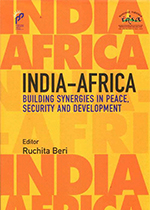
- Publisher: Pentagon Press
2024
This book represents an effort to present views on peace, security and development partnership between India and the African countries. India and Africa both recognise that peace, security and development are intimately interwoven. While peace ensures opportunity for development, security enables as well as protects fruits of development. Africa is a continent which has witnessed many conflicts. However, Africa has also witnessed economic growth and political reform in the past decade. This volume brings together perspectives from Indian and African experts on diverse issues such as security, trade, development, conflict resolution, peacekeeping, terrorism and climate change. It will be of interest to students and researchers of African studies, India- Africa relations and security studies.- ISBN: 9788196872298 ,
- Price: ₹ 1295/-
- Publisher: Pentagon Press
-
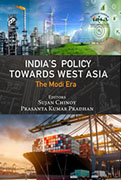
- Publisher: Pentagon Press
2024
West Asia holds significant relevance for India due to a multitude of economic, political, strategic and security factors. India considers the West Asian region as its ‘extended neighbourhood.’ Since Prime Minister Narendra Modi assumed office in 2014, India’s West Asia policy has received renewed attention, marking a notable transformation in its foreign policy approach towards the countries of the region. In recent years, engagement between India and the West Asian region has moved beyond the traditionally dominant spheres of trade, energy and diaspora ties. India has emphasised cooperation in the fields of defence and security, building strategic partnerships and is exploring new areas of cooperation in sectors such as renewable energy, health, climate change, food security, connectivity and so on. Prime Minister Modi’s ‘Think West’ policy has further prioritised engagement with the West Asian countries.This book provides scholarly perspectives on Modi’s policy and approach towards the West Asian region. The authors reflect on different dimensions of the India–West Asia relationship, examine the key changes in India’s approach under the Modi government and explore the opportunities and prospects of cooperation in the new and emerging fields. The authors aver that Prime Minister Modi’s continuous engagement with the regional leaders at bilateral and multilateral levels, the convergence of interests between India and the West Asian countries, India’s increasing stakes in the region and a changing perception of India in the minds of regional leaders are some of the key drivers of the fast-growing India–West Asia relationship.
- ISBN: 978-81-968722-2-9 ,
- Price: ₹ 1295/-
- Publisher: Pentagon Press
-
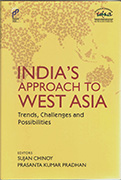
- Publisher: Pentagon Press
2024
This volume provides perspectives of scholars from India and West Asia on several bilateral issues of concern, challenges and scope for further cooperation. The authors contend that a convergence of interests between India and West Asian countries across numerous domains, coupled with India`s escalating stakes in the region, and the growing recognition among West Asian nations of India`s burgeoning economic and political influence, stand as key drivers underpinning the India-West Asia relationship. Furthermore, they have underscored that under the leadership of Prime Minister Narendra Modi, India’s West Asia policy has undergone a major transformation.- ISBN: 9789390095971 ,
- Price: ₹ 995/-
- Publisher: Pentagon Press
-
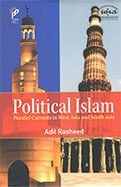
- Publisher: Pentagon Press
2023
This book deals with the history of Muslim political thought from the time of the Prophet to early 21" century in `West Asia` (an Indian alternative to the `colonial` term Middle East) and South Asia. Although Islam does not present nor recommend any political philosophy or state-like system per se, Muslim scholars and theologians have over the centuries recommended ways for establishing an ideal Islamic polity based on Quranic inferences, precedents of the Prophet and some early Caliphs. Although Political Islam strictly refers to only a century-old religious-political revivalist movement, this book covers historical concepts and developments that serve as political antecedents for contemporary Political Islam in the two regions.- ISBN: 9788195189458 ,
- Price: ₹ 1995/-
- Publisher: Pentagon Press
-
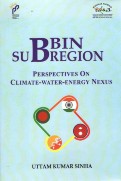
- Publisher: Pentagon Press
2023
Bangladesh, Bhutan, India and Nepal (BBIN) are home to 21 per cent of the world’s population. With projected economic growth in the BBIN countries, a consequent increase in the demand for electricity and heavy dependence on fossil fuels are expected despite the pitch for renewable energy. The region also faces unprecedented climate change, particularly in the Hindu Kush Himalaya, the cradle of major sub-continental rivers, and where melting glaciers, unpredictable weather conditions, and rainfall patterns are affecting the life of millions and instigating frequent natural disasters. Since 2014, India has tried to maximise sub-regional interaction with the aim of promoting cooperation in the economic, social, cultural and scientific fields. This has opened new thinking and opportunities, complementing the pace of globalisation and liberalisation. The fear, of course, is that this approach can easily dissipate in the face of security complexities and political difficulties.The climate-water-energy nexus is now a familiar concept in the resource management debate requiring long-sighted approaches that help avoid maladaptive pathways and, as a tool, to anticipate the tilt and balance of the nexus resources and the nature of their interactions. The nexus as a policy approach brings together the concept of ‘security and sustainability’. However, the framing of the nexus around a scarcity crisis narrative often pushes states towards control and possessiveness of the resources rather than driving them towards stability and durability solutions. Beyond this framework, a more nuanced political–economy understanding of the BBIN sub-region is essential.
- ISBN: 9788195189458 ,
- Price: ₹ 995/-
- Publisher: Pentagon Press
-
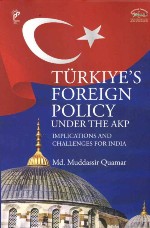
- Publisher: Pentagon Press
2023
During the first two decades of the twenty-first century, besides the structural factors namely geography, history, politics, international system and the world order, five conjunctural factors dominated Turkish foreign policy behaviour and conduct. These include the Strategic Depth (Stratejik Derinlik) doctrine with ‘zero-problem’ with neighbours embedded in it followed by the Blue Homeland (Mavi Vatan) doctrine focused on enhancing Türkiye’s maritime presence in its immediate neighbourhood and the periphery. Thirdly, and arguably the most important, is the personality of Recep Tayyip Erdogan who as a dominating figure in contemporary Turkish politics has shaped not only the political discourse but foreign policy praxis. Erdogan’s personalised style of interventions has undoubtedly had a profound impact on Ankara’s interactions and engagements with the wider world. Finally, pan-Islamism and neo-Ottomanism are two important drivers in Turkish foreign policy and were visible notably in the Middle East and North Africa region and came into prominence in the wake of the Arab Spring uprisings. In this context, it is pertinent to ask what are Turkish foreign policy ambitions and how do these impact India? Given that Ankara has expanded its presence, or at least is striving to expand it, in the geographically contiguous Southwest Asia region that connects India to the Middle East, the question how Indian foreign policy should view Türkiye becomes even more important. The bilateral challenges between India and Türkiye make it even more pertinent for Indian scholars and policymakers to take a deep and hard look at Türkiye’s foreign policy doctrines and praxis. This book is an attempt in that direction. It systematically analyses the structural and conjunctural factors in Turkish foreign policy and notes that Türkiye’s foreign policy is embedded in a glorified identification of the past, both Ottoman and Kemalist, and in its geographical location as a multi-regional actor. However, the foreign policy ambitions are limited by Türkiye’s economic performance and political sliding. From an Indian viewpoint, the book identifies Pakistan as a limiting factor so far as the bilateral relations are concerned and recommends that New Delhi should use economic leverage and diplomacy to de-hyphenate the Pakistan factor.- ISBN: 9788195189427 ,
- Price: ₹ 995/-
- Publisher: Pentagon Press
-
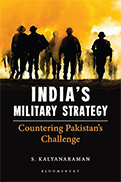
- Publisher: Bloomsbury
2022
This book explores what military strategy is and how it is interconnected with policy on one hand and military operations on the other. In the process, it traces the transformation of the notion of strategy from its original military moorings to a more policy-oriented and-influenced conception and elaborates upon a tripartite framework of policy, strategy and doctrine to think about, understand, and analyse the use of force. The book explores the politics of India-Pakistan conflict in order to root the study of Indian military strategy in the political sphere. It discusses three main issues that have ensured the persistence of conflict: incompatible national identities, Pakistan's congenital quest for parity with and compulsion to challenge India, and irreconcilable positions on the Kashmir issue. The book argues that India has invariably pursued limited political aims that did not threaten Pakistan's survival or form of government or regime in power albeit containing a counter offensive elements. It states that India employed the strategy of exhaustion during the Indian Army's campaigns in the 1947-48 conflict and 1965 war, which made way to strategy of annihilation during the 1971 war (East Pakistan), but after Pakistan's acquisition of nuclear weapons capability the strategy is back to exhaustion. The book highlights the importance of designing an overall military strategy for waging limited war and pursuing carefully calibrated political and military objectives by creatively combining the individual doctrines of the three services by establishing a Chief of Defence Staff system.- ISBN: 9789356400023 ,
- Price: ₹ 1299/-
- Publisher: Bloomsbury
-
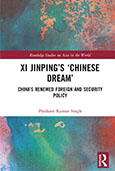
- Publisher: Routledge Taylor & Francis
2022
The author analyses the influence of Xi’s 'Chinese Dream' on China’s foreign relations and security postures.Xi Jinping’s rise has led to a paradigm shift in many aspects of China’s domestic and international politics. A key element of this has been the ideological vision shorthanded as the 'Chinese Dream', combining elements of nationalism, Confucian ideology, and economic expansionism. Singh evaluates the various changes in China’s nominally communist ideology in the post-Mao era, with an emphasis on the implications for China’s economic and security relations with other countries. He particularly focusses on China’s approach to South Asia and the Indian Ocean Region, key elements of China’s strategy.
An insightful guide to understanding the direction of China’s foreign and security policy, and especially its impact on India–China relations.
- ISBN: 9781032375328 ,
- Price: £84.00
- Publisher: Routledge Taylor & Francis
-
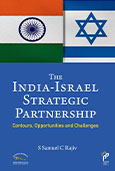
- Publisher: Pentagon Press
2022
India and Israel marked three decades of the establishment of full diplomatic ties in January 2022. In the aftermath of the historic visit of Prime Minister Narendra Modi to Israel in July 2017, India-Israel relations have acquired a new momentum and strategic depth.Defence and security cooperation have been the mainstays of the partnership. The study notes that India is taking a series of measures to enhance domestic procurement and defence indigenization. Going forward, strategic partners like Israel will be expected to continue to work more closely with the domestic defence industry to fulfil the critical requirements of India’s armed forces.
On reginal security issues like the Iranian nuclear contentions, India has adopted positions largely in opposition to the preferred Israeli policy preferences. India has, however, consistently held that it is opposed to the possibility of a nuclear Iran, given the negative repercussions for regional security and stability, as well as due to the Iran-Pakistan proliferation linkages.
India’s Palestine policy, meanwhile, will continue to be guided by its core principles on the issue, even as the possibility of an independent Palestinian state, living side by side with Israel, looks difficult to materialize in the near to mid-terms. This is even as the schisms within the Palestinian national movement look set to expand in the post-Mahmoud Abbas era.
The book brings to attention the dynamic path India-Israel relations have traversed in the past three decades, encompassing areas of defence and security and high-technology cooperation. New vistas of engagement are being pursued by both countries, bilaterally as well as with other countries. The first I2U2 Summit meeting held between the leaders of India, Israel, the UAE and the US in July 2022 emphasized the geo-economic focus of the unique mini-lateral group. An India-Israel enhanced strategic partnership is a win-win proposition, bilaterally and across regions.
- ISBN: 978-93-90095-70-4 ,
- Price: ₹ 995
- Publisher: Pentagon Press
